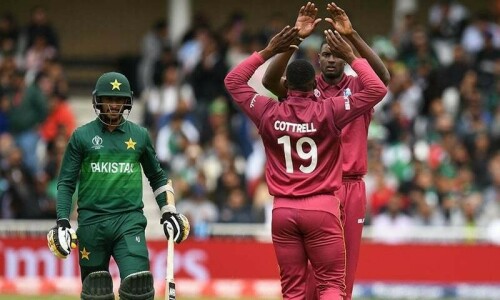NEW YORK, Oct 6: Egyptian sheik Reda Shata considered himself a partner in New York’s fight against terrorism. He cooperated with the police and FBI, invited officers to his mosque for breakfast, even dined with Mayor Michael Bloomberg.
Despite the handshakes and photo ops, however, the New York Police Department (NYPD) was all the while watching him.
Even as Shata’s story was splashed across the front page of The New York Times in a Pulitzer Prize-winning series about Muslims in America, an undercover officer and an informant were assigned to monitor him, and two others kept tabs on his mosque that same year.
An Associated Press investigation has found that the NYPD dispatched undercover officers into ethnic communities to monitor daily life and scrutinised more than 250 mosques and Muslim student groups in the years after the Sept 11 terrorist attacks. Some of its programmes were developed with the help of seasoned CIA officers.
“What did they find?” Shata asked through an interpreter at his current mosque in Monmouth County, N.J., after learning about the secret surveillance. “It’s a waste of time and a waste of money.”
Shata welcomed FBI agents to his mosque to speak to Muslims, invited NYPD officers for breakfast and threw parties for officers who were leaving the precinct during his time at the Islamic Centre of Bay Ridge. As police secretly watched him in 2006, he had breakfast and dinner with Bloomberg at Gracie Mansion and was invited to meet with Police Commissioner Raymond Kelly, Shata recalls.
“This is very sad,” he said after seeing his name in the NYPD file. “What is your feeling if you see this about people you trusted?”
This was life in America for Shata: a government partner in the fight against terrorism and a suspect at the same time.
The dichotomy between simultaneously being partner and suspect is common among some of New York’s Muslims. Some of the same mosques that city leaders visited to hail their strong alliances with the Muslim community have also been placed under NYPD surveillance — in some cases infiltrated by undercover police officers and informants.
In April, more than 100 area imams publicly supported a rally to “oppose wars, condemn terrorism and fight Islamophobia.”
Of those, more than 30 were either identified by name or work in mosques included in the NYPD’s 2006 listing of suspicious people and places.
“The way things are playing out in New York does not paint a picture of partnership and of a conversation among equals,” said Ramzi Kassem, a professor at the City University of New York School of Law. “It seems that city officials prefer hosting Ramadan banquets to engaging with citizens who wish to hold them to account. Spying on almost every aspect of community life certainly does not signal a desire to engage constructively.”
On Wednesday, seven New York Democratic state senators called for the state attorney general to investigate the NYPD’s spying on Muslim neighbourhoods. And last month, the CIA announced an inspector general investigation into the agency’s partnership with the NYPD.
A small number of Capitol Hill and New York lawmakers have called for greater oversight and controls over the police department’s intelligence unit. But most in politics, including President Barack Obama, have shown no interest in even talking about what the NYPD is doing, much less saying whether they support it.
NYPD spokesman Paul Browne did not return messages over two days. Bloomberg’s office, which has repeatedly referred questions to the NYPD, also did not respond.
Liberal members of New York City Council and Muslim and civil rights groups plan to publicly raise questions Thursday about the police department’s tactics in the years since 9/11.
The spying has not been limited to Shata.
In May, Bloomberg and Kelly organised a news conference to discuss two suspected terrorists. Appearing with the officials was Mohammad Shamsi Ali, an imam regularly at the mayor’s side for public appearances that touch on Muslim issues. Shamsi Ali said he and the mayor have maintained good communication over the years. In July, he was invited to a pre-Ramadan conference hosted by the NYPD, and for the past three years he said he has been invited to speak at the police academy about Islam and Muslims.
Yet in 2006, the NYPD infiltrated two mosques where Shamsi Ali holds leadership roles — the Islamic Cultural Centre of New York and the Jamaica Muslim Centre. The NYPD cited radical rhetoric and possible money laundering in the Islamic Cultural Centre of New York and said the Jamaica Muslim Centre was a hub of radicalization that offered martial arts training. Shamsi Ali said he was unaware of the police assessments and denied the underlying accusations.—AP













































Dear visitor, the comments section is undergoing an overhaul and will return soon.